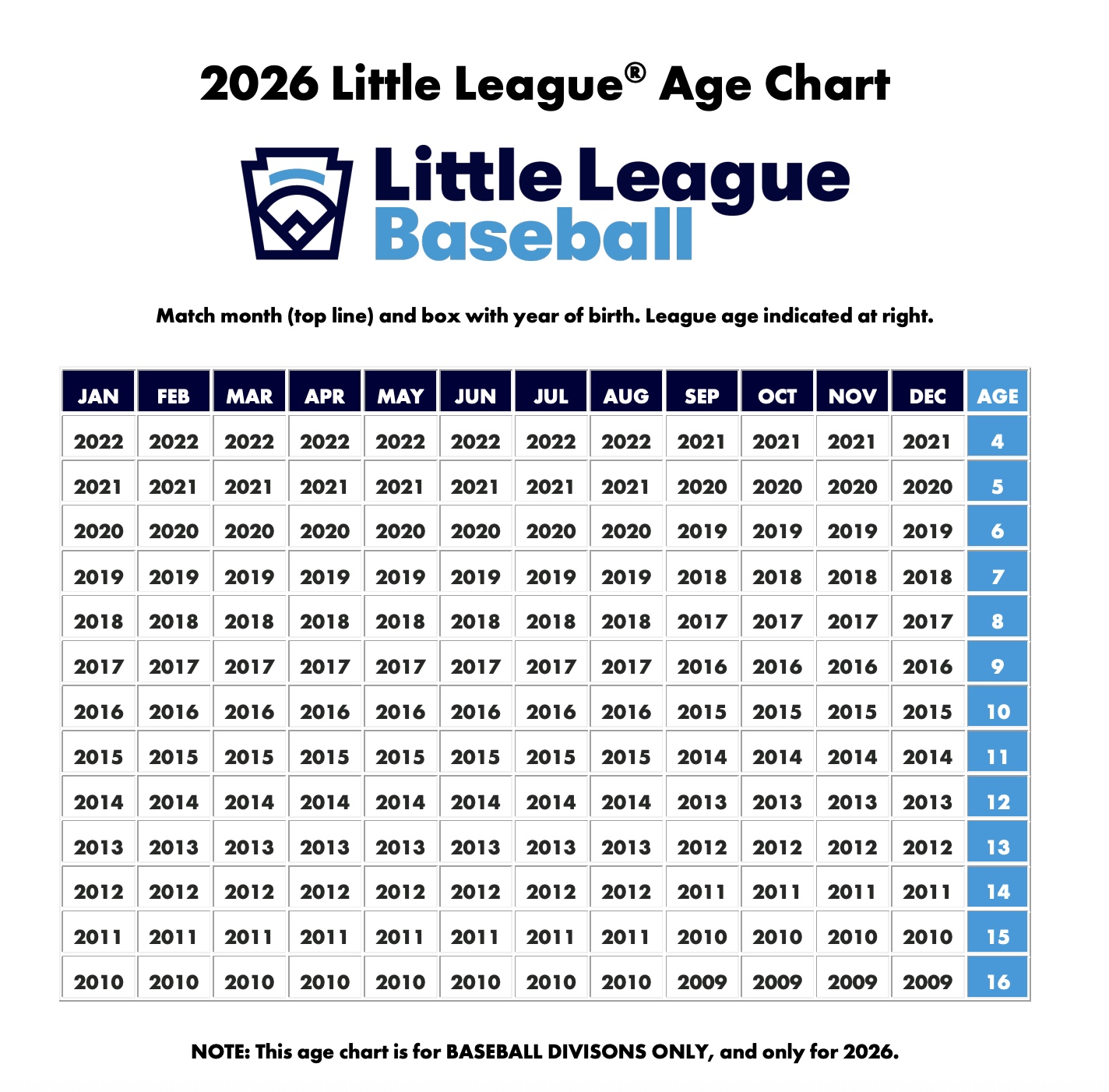Avon Grove Little League serves Baseball and Softball programs throughout the year. Spring is our busiest season, but we also pride ourselves in organizing instructional baseball and softball programs during the fall months.
See below for the variety of Baseball Divisions available throughout the year, and use the Little League Age Chart at the bottom of the page to determine your players appropriate age. Avon Grove Challenger Division: This is Little League’s adaptive baseball program for individuals with physical or intellectual challenges, ages 4-18, or up to 22 if still in school. If an individual can participate in the traditional Little League Baseball or Softball program with reasonable accommodations, they should do so. The league uses Tee-Ball rules and focuses entirely on providing a positive and happy experience for the players, with support from coaches, buddies, and fans. (Available in the spring season only.)
Tee Ball (4-6 YO): This is a fun program designed to encourage players to have fun while learning baseball fundamentals. Each team will consist of 8-10 players who have a League Age of 4 to 5. Eligible players who are league age 6 may play in the t-ball division if requested and approved by the league. Team records and individual player statistics are not counted. Outs and runs scored are not counted. See here for full AGALL Baseball Tee Ball Rules. Coach Pitch (6-8 YO): This division focuses on fun and learning baseball fundamentals. Teams of 10-12 players are generally League Age 6 or 7. League Age 8 players can join upon request (e.g., new to baseball), and League Age 5 players may be approved if sufficiently advanced. No team records or individual stats are kept. Outs and runs are counted per inning to maintain game pace. See here for full AGALL Baseball Coach Pitch Rules. Rookies (7-9 YO): The Rookies division focuses on introducing players (primarily League Age 7 & 8, moving from Coach Pitch) to kid pitch and developing fundamentals. Teams consist of 11-13 players. Team records are tracked for playoffs, and pitch counts are tracked via GameChanger. The division is growth-oriented, with limited coach assistance to maintain pace of play. League Age 9 players new to baseball may request to join, pending Competition Committee approval. See here for full AGALL Baseball Rookies Rules. Minors (8-11 YO): This division focuses on teaching proper baseball fundamentals and encouraging fun, while gradually introducing competition. Teams will have 11-13 players, league age 8-10. Players aged 7-11 may play with approved requests (up by evaluation or down for safety from Majors). Players should play at least one year of Rookies before Minors. Team records/stats must be kept but are not the primary goal. See here for full AGALL Baseball Minors Rules. Majors (10-12 YO): This division focuses on developing advanced baseball skills, increasing the competitive aspect while still promoting enjoyment. Team records/stats must be kept but are not the primary goal. Teams will have 11-13 players who are League Age 10 or 11. League Age 9 players may be used if approved via evaluation. See here for full AGALL Baseball Majors Rules. Intermediate (11-13 YO): This is our competitive division, adhering to Little League (green book) rules with minimal exceptions. It is also known as 50’/70’ (50-foot pitching, 70-foot base paths). This division prioritizes player enjoyment and mastery of baseball fundamentals. Teams will have 11-13 players who are League Age 12 or 13. Eligible League Age 11 players may be used to fill rosters as needed if and approved through evaluations. See here for full AGALL Baseball Intermediate Rules. Juniors (12-14 YO): A competitive, recreational baseball division for League Age 12-14 players (15 years also allowed if skillset requires it). It serves as a transition to the standard 60’/90’ diamond, introducing advanced elements like lead-offs, pick-offs, and Designated Hitters. Players must use BBCOR certified bats and increase speed, strength, and game knowledge. Games are scheduled evenings/weekends to accommodate middle/high school baseball and counts towards tournament eligibility. AGALL Juniors follows the Little League International Juniors Rules and Guidelines. Seniors (13-16 YO): A competitive, recreational baseball division for League Age 13-16 players, serving as the next step up from Juniors. Players play on a 60’/90’ diamond, introducing advanced elements like lead-offs, pick-offs, and Designated Hitters. Players must use BBCOR certified bats and increase speed, strength, and game knowledge. Games are scheduled evenings/weekends to accommodate middle/high school baseball and counts towards tournament eligibility. AGALL Seniors follows the Little League International Seniors Rules and Guidelines.

|